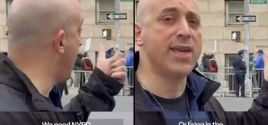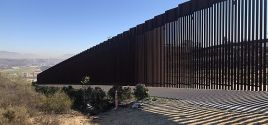Canadians might agree to suspend civil liberties in a pandemic: SurveyBy Sharon Kirkey , Canwest News ServiceSep. 23, 2009 |
Popular 
'Sniper Seen on Roof Overlooking Pro-Palestine Protest' at Indiana University

Mike Johnson Pushes Debunked Lie That Israeli Babies Were 'Cooked in Ovens' On October 7

ADL Urged Congress to Pass FISA Law Spying on Americans to 'Protect Israel'

Axios Poll: Majority of Americans Now Want Mass Deportations

Claim Jewish Student Was 'Stabbed In The Eye' by Pro-Palestine Protester Draws Mockery After Video Released
 Very questionable poll, clearly their intention is to urge the public to give up all their rights. - ILCanadians are bullish on giving government officials permission to restrict personal freedoms in a flu pandemic, with half of those surveyed agreeing that violation of a quarantine order would be tantamount to manslaughter. As well, 90 per cent of Canadians surveyed for a research report in pandemic ethics believe doctors and nurses have an obligation to report to work during a pandemic, provided safety precautions are in place. Almost half — 48 per cent — say that health care workers who do not show up for work without a legitimate excuse should be fired or lose their professional licenses. The survey, conducted for the University of Toronto Joint Centre for Bioethics, is based on a random sample of 500 Canadians surveyed by phone, and nearly 100 more via a series of town hall meetings. The survey was taken between August 2008 to February 2009 — just before the H1N1 outbreak began in April. The town halls straddled the start. Both were designed to inject the public's voice into debates usually left to the experts, and the results come as officials brace for an anticipated second wave of H1N1 flu. Researchers are warning that the serious ethical challenges that could accompany a pandemic need to be thought through now, while there's still time to respond. "There's going to be a lot of uncertainty to decision making, even in a mild pandemic," says Dr. Ross Upshur, director of the U of T bioethics centre, which Wednesday released a series of research papers on pandemic ethics. The reports draw on lessons learned from the SARS outbreak and address issues from whether health care workers have an implicit duty to treat patients, to fraught ethical questions such as: who should get the last bed and ventilator in an intensive care unit — a cyclist who has suffered a severe, but potentially reversible brain injury, or a nurse infected with H1N1 while caring for patients who need immediate ventilation support? "Even though there may be some skepticism about perhaps overreaction to H1N1, let's remember the past. We weren't prepared for SARS," Upshur says. "There's still a lot of uncertainty about H1N1. It's still a new pathogen," he says. "It seems to be tracking reasonably mild. But there are still ethical issues that require discussion." Past surveys have suggested anywhere from 25 to 85 per cent of health-care workers would be unwilling to show up for work in a pandemic. "If you think of it, that's a pretty stunning number," Upshur says. He says professional codes of ethics and regulatory bodies haven't set clear directives on what they expect of health care professionals in a disease crisis. A large majority — 85 per cent — of those who responded to the U of T survey agreed governments should have the power to suspend some individual rights, such as travelling and the right to assemble, during a flu pandemic, and "social distancing" measures such as school closures. But they also said governments have an obligation to provide for the basic needs of restricted individuals, such as food, shelter and social support. "Canadians are accepting of duly issued orders by public health authorities if they're clearly communicated . . . and they're not left on their own to fend for themselves without support of some kind," Upshur said. Asking people to suspend their civil liberties "is legitimate, for a time limited period, if it's clearly communicated and measures for support are put in place," he said. But while the survey found broad support for quarantine and isolation in a pandemic, the report says high levels of public trust and communication will be essential in managing a flu crisis. Poor communication contributed to the confusion and spread of the SARS virus in 2003. Upshur said officials need to be open and honest about what is, and what isn't known about the situation. "People feel confident and accepting of interventions when there's trust in the public institutions and their capacity to respond," Upshur said. "We know that once violated it's very hard to recover it, and that it's very easy to violate trust." When asked whether health care workers should be conscripted into service during a pandemic, 47 per cent agreed, while 43 per cent disagreed. But survey respondents also said that having to care for a sick relative, or having a serious health problem that could make people more vulnerable to flu, were legitimate excuses from work. Upshur said hard decisions will need to be made about who should have access to ventilators, vaccines, antivirals and other resources in a flu outbreak. Ninety-four per cent of those surveyed said health care workers should receive priority for antivirals, followed by children. They said scarce medical resources ought to be given to those most likely to survive. One of the most contentious issues could be vaccination, Upshur says. The swine flu vaccine is expected to be deployed before all the data from human trials that test safety are complete. The researchers say "rigorous" surveillance systems need to be put in place to monitor for vaccine safety and effectiveness and that a no-fault compensation program for all of Canada should accompany the roll out of the H1N1 flu shots. © Copyright (c) Canwest News Service |



